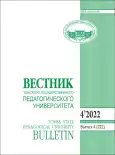THE ECHO OF V. A. ZHUKOVSKY’S WORKS IN N. V. GOGOL’S STORIES “NEVSKY PROSPEKT”, “THE PORTRAIT”, “THE OVERCOAT”
- Authors: Shchukov D.A.1
-
Affiliations:
- National Research Tomsk State University
- Issue: No 4 (2022)
- Pages: 107-120
- Section: LITERARY STUDIES
- URL: https://bakhtiniada.ru/1609-624X/article/view/268950
- DOI: https://doi.org/10.23951/1609-624X-2022-4-107-120
- ID: 268950
Cite item
Full Text
Abstract
Keywords
About the authors
Denis Aleksandrovich Shchukov
National Research Tomsk State University
Email: d.schukov@gmail.com
pr. Lenina, 36, Tomsk, Russian Federation, 634050
References
- Мусатова Т. Л. Новая книга о Гоголе в Риме (1837–1848). Мир писателя, «духовно-дипломатические дела», эстетика, поиски социального служения. Материалы и исследования. М.: БуксМАрт, 2020. Т. 2. 672 с.
- Гоголь Н. В. Полное собрание сочинений: в 14 т. М.: Изд-во АН СССР, 1938. Т. 3. 728 с.
- Жуковский В. А. Полное собрание сочинений и писем: в 20 т. М.: Языки русской культуры, 2000. Т. 2. 840 c.
- Котляревский Н. А. Николай Васильевич Гоголь. 1829–1842. Очерк из истории русской повести и драмы. М.: Летний сад, 2009. 404 c.
- Жуковский В. А. Полное собрание сочинений и писем: в 20 т. М.: Языки славянских культур, 2012. Т. 12. 544 с.
- Давыдов А. П. Душа Гоголя. Опыт социокультурного анализа. М.: Новый хронограф, 2018. 264 с.
- Виролайнен М. Н. Исторические метаморфозы русской словесности. СПб.: Пальмира, 2016. 495 с.
- Жуковский В. А. Полное собрание сочинений и писем: В 20 т. М.: Языки русской культуры, 1999. Т. 1. 760 c.
- Гоголь Н. В. Петербургские повести. СПб.: Наука, 1995. 296 с.
- Станичук И. А. Феномен ночи в творчестве Н. В. Гоголя: дис. … канд. филол. наук. Тверь, 2014. 192 с.
- Аношкина-Касаткина В. Н. Русский романтизм. В. А. Жуковский, А. С. Пушкин. М.: ИИУ МГОУ, 2014. 400 с.
- Жуковский В. А. Полное собрание сочинений и писем: в 20 т. М.: Языки славянских культур, 2008. Т. 3. 456 с.
- Лонсбери Э. Скудная культура, высокое искусство: Гоголь, Готорн и профессиональное писательство в России и Америке в XIX веке. СПб.: Academic Studies Press / Библиороссика, 2021. 456 с.
- Виноградов И. А. Страсти по Гоголю. О духовном наследии писателя. М.: Вече, 2018. 320 с.
- Иваницкий А. И. Спиритуализация власти и службы у позднего Гоголя: мотивные источники // Имагология и компаративистика. 2020. № 14. С. 168–185.
- Жуковский В. А. Полное собрание сочинений и писем: в 20 т. М.: Языки славянской культуры, 2012. Т. 9. 536 с.
- Виницкий И. Ю. Дом толкователя: Поэтическая семантика и историческое воображение В. А. Жуковского. М.: Новое литературное обозрение, 2006. 328 с.
- Киселев В. С. Письма царственных особ к В. А. Жуковскому и семантика «семейственной монархии» // Имагология и компаративистика. 2020. № 14. С. 5–36.
- Портер Дж. Экономика чувств: русская литература эпохи Николая I. СПб.: Academic Studies Press / Библиороссика, 2021. 255 с.
- Семенова С. Г. Русская литература XIX–XX веков: от поэтики к миропониманию. М.: Академический проект; Парадигма, 2016. 890 с.
- Тодд У. М. Социология литературы: институты, идеология, нарратив. СПб.: Academic Studies Press / Библиороссика, 2020. 352 с.
- Жуковский В. А. Полное собрание сочинений и писем: в 20 т. М.: Языки славянской культуры, 2014. Т. 10. Кн. 1. 528 с.
- Гончаров С. А. Творчество Гоголя в религиозно-мистическом контексте. М.: Юрайт, 2021. 228 с.
Supplementary files






